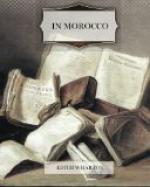In truth the only life in her is centred in the market-place outside the walls, where big expanding Rabat goes on certain days to provision herself. The market of Sale, though typical of all Moroccan markets, has an animation and picturesqueness of its own. Its rows of white tents pitched on a dusty square between the outer walls and the fruit-gardens make it look as though a hostile tribe had sat down to lay siege to the town, but the army is an army of hucksters, of farmers from the rich black lands along the river, of swarthy nomads and leather-gaitered peasant women from the hills, of slaves and servants and tradesmen from Rabat and Sale; a draped, veiled, turbaned mob shrieking, bargaining, fist-shaking, call on Allah to witness the monstrous villanies of the misbegotten miscreants they are trading with, and then, struck with the mysterious Eastern apathy, sinking down in languid heaps of muslin among the black figs, purple onions and rosy melons, the fluttering hens, the tethered goats, the whinnying foals, that are all enclosed in an outer circle of folded-up camels and of mules dozing under faded crimson saddles.
[Illustration: From a photograph by Schmitt, Rabat
Sale—market-place outside the town]
VI
CHELLA AND THE GREAT MOSQUE
The Merinid Sultans of Rabat had a terribly troublesome neighbour across the Bou-Regreg, and they built Chella to keep an eye on the pirates of Sale. But Chella has fallen like a Babylonian city triumphed over by the prophets; while Sale, sly, fierce and irrepressible, continued till well on in the nineteenth century to breed pirates and fanatics.
The ruins of Chella lie on the farther side of the plateau above the native town of Rabat. The mighty wall enclosing them faces the city wall of Rabat, looking at it across one of those great red powdery wastes which seem, in this strange land, like death and the desert forever creeping up to overwhelm the puny works of man.
The red waste is scored by countless trains of donkeys carrying water from the springs of Chella, by long caravans of mules and camels, and by the busy motors of the French administration; yet there emanates from it an impression of solitude and decay which even the prosaic tinkle of the trams jogging out from the European town to the Exhibition grounds above the sea cannot long dispel.
Perpetually, even in the new thriving French Morocco, the outline of a ruin or the look in a pair of eyes shifts the scene, rends the thin veil of the European Illusion, and confronts one with the old grey Moslem reality. Passing under the gate of Chella, with its richly carved corbels and lofty crenellated towers, one feels one’s self thus completely reabsorbed into the past.
Below the gate the ground slopes away, bare and blazing, to a hollow where a little blue-green minaret gleams through fig-trees, and fragments of arch and vaulting reveal the outline of a ruined mosque.




